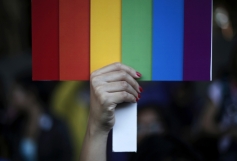
A petition seeking to ban transgender conversion therapy in the United States following the suicide of transgender teenager Leelah Alcorn has attracted almost 290,000 signatures.
Alcorn, born Joshua, was 17 when she committed suicide on 28 December, having scheduled a note of explanation to be posted on Tumblr after her death.
She wrote in her last message that she hoped her suicide would help other transgender people. "My death needs to mean something," she said. "My death needs to be counted in the number of transgender people who commit suicide this year."
She ended by saying "Fix society. Please."
The Change.org petition, addressed to President Barack Obama, was set up by the Transgender Human Rights Institute in response to that plea.
Alcorn outlined in her suicide note the response she had received from her parents. She said her mother "reacted extremely negatively, telling me that it was a phase, that I would never truly be a girl, that God doesn't make mistakes, that I am wrong."
Her family also took her out of school for a period of time and tried to keep her away from social media.
Alcorn added: "My mom started taking me to a therapist, but would only take me to Christian therapists, (who were all very biased) so I never actually got the therapy I needed to cure me of my depression. I only got more Christians telling me that I was selfish and wrong and that I should look to God for help."
The petition blames the use of conversion therapy for Leelah's death. "'Conversion therapies' have been documented to cause great harms and in this case, Leelah's death," the petition reads. "Therapists that engage in the attempt to brainwash or reverse any child's gender identity are seriously unethical and legislation is needed to end such practices immediately. Transgender youth have one of the highest suicide rates in the nation. We must not allow therapists to increase those rates with therapy methodologies that have been demonstrated in harming transgender youth."
It calls for the ban on such therapies to be called 'Leelah's Law'.
The National Transgender Discrimination Survey found in 2011 that the prevalence of suicide attempts among transgender Americans is 41 per cent, significantly higher than the 4.6 per cent of the whole US population who report a suicide attempt at some point during their life. Suicide attempts are also more common among transgender people than the homosexual and bisexual communities.
Rev Sally Hitchiner, founder and director of Diverse Church, a support network for LGBT young people in the Church, said that the use of reparative therapy is also prevalent and among the LGBT Christian community in the UK.
"My experience of reparative therapy to attempt to make LGBT people straight through prayer or counselling is that it is extremely damaging both to the mental health of the individual and to their relationship with the church, friends and family members who encourage it," Hitchiner told Christian Today.
"Many of the gay, bi and trans young adults in Diverse Church have experienced one off or an ongoing course of reparative therapy and all of them have found it deeply damaging and often leading them to feelings of suicide or feeling they have no hope with God when it doesn't work.
"The experience of trying to change something so ingrained in who you are leaves young people, in particular, with deep scars of feeling that they are not really loved for who they are. I wholeheartedly support my American brothers and sisters in calling for this to be eliminated from culture."
Since her death Leelah's parents have maintained their religious convictions on the issue.
"We don't support that, religiously," her mother, Carla Alcorn, said in an interview with CNN. "But we told him [Leelah/Joshua] that we loved him unconditionally. We loved him no matter what. I loved my son. People need to know that I loved him. He was a good kid, a good boy."
She added that her son had never mentioned the name Leelah; the first time she saw the name was in the suicide note.















